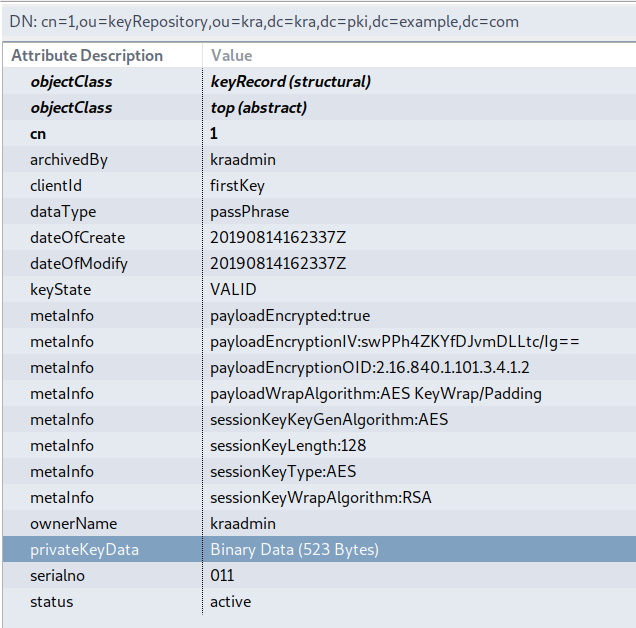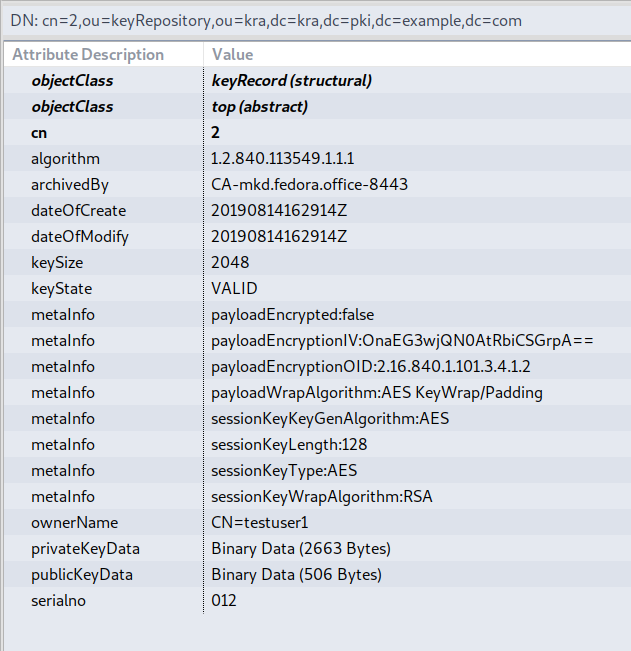Key Storage Mechanism - dogtagpki/pki GitHub Wiki
The KRA stores keys by using a generated symmetric key (using algorithms like AES, DES3) and wraps the symmetric key with an asymmetric public key (using algorithms like RSA).
You can modify the encryption algorithms by modifying the corresponding entries in /var/lib/pki/pki-tomcat/conf/kra/CS.cfg:
The following snippet is taken from an installed instance
kra.storageUnit.wrapping.0.payloadEncryptionAlgorithm=DESede kra.storageUnit.wrapping.0.payloadEncryptionIV=AQEBAQEBAQE= kra.storageUnit.wrapping.0.payloadEncryptionMode=CBC kra.storageUnit.wrapping.0.payloadEncryptionPadding=PKCS5Padding kra.storageUnit.wrapping.0.payloadWrapAlgorithm=DES3/CBC/Pad kra.storageUnit.wrapping.0.payloadWrapIV=AQEBAQEBAQE= kra.storageUnit.wrapping.0.sessionKeyKeyGenAlgorithm=DESede kra.storageUnit.wrapping.0.sessionKeyLength=168 kra.storageUnit.wrapping.0.sessionKeyType=DESede kra.storageUnit.wrapping.0.sessionKeyWrapAlgorithm=RSA kra.storageUnit.wrapping.1.payloadEncryptionAlgorithm=AES kra.storageUnit.wrapping.1.payloadEncryptionIVLen=16 kra.storageUnit.wrapping.1.payloadEncryptionMode=CBC kra.storageUnit.wrapping.1.payloadEncryptionPadding=PKCS5Padding kra.storageUnit.wrapping.1.payloadWrapAlgorithm=AES KeyWrap/Padding kra.storageUnit.wrapping.1.sessionKeyKeyGenAlgorithm=AES kra.storageUnit.wrapping.1.sessionKeyLength=128 kra.storageUnit.wrapping.1.sessionKeyType=AES kra.storageUnit.wrapping.1.sessionKeyWrapAlgorithm=RSA
More algorithms can be added by modifying the entry number. The following parameter chooses the type 1 encryption algorithm:
kra.storageUnit.wrapping.choice=1
To archive a passphrase specified in the command-line:
$ pki -d ~/.dogtag/pki-tomcat/ca/alias -c Secret.123 -n caadmin \
kra-key-archive \
--clientKeyID test \
--passphrase secret
------------------------
Archival request details
------------------------
Request ID: 0x1
Key ID: 0x1
Type: securityDataEnrollment
Status: complete
This creates an entry similar to the following in LDAP:

The metaInfo field contains all the required info used in encryption. Note that privateKeyData is a Binary Data and can be viewed using following ldapsearch command:
$ ldapsearch -H ldap://127.0.0.1:389 -x -D "cn=Directory Manager" -W -b "cn=4,ou=keyRepository,ou=kra,dc=kra,dc=pki,dc=example,dc=com" Enter LDAP Password: # extended LDIF # # LDAPv3 # base <cn=4,ou=keyRepository,ou=kra,dc=kra,dc=pki,dc=example,dc=com> with scope subtree # filter: (objectclass=*) # requesting: ALL # # 4, keyRepository, kra, kra.pki.example.com dn: cn=4,ou=keyRepository,ou=kra,dc=kra,dc=pki,dc=example,dc=com objectClass: top objectClass: keyRecord keyState: VALID serialno: 014 ownerName: kraadmin privateKeyData:: MIIBFgSCAQBAeY/Hn2ahIJgMeqHHdqOor6wC+vawbFMqDpmpXfx2mQgue5Rsu VBIJQ0Sv9bbVOnHgC7BtwJQk8EjnQqMh8MfrLxoDpfWZ74XnmW3WY/aHaOFsxKY2VRGubiCKHPXlo Ze6KfwHDUF9qi84rf/8qPjCUQvQxIThagajEwUM5DNw0S1i0K8TebXuFDXPC1qytywjUA37E4j98+ wZXQGQo89Y91WV+h1b/j1HgTfAXeuS0uWr4e5gRzsvHqoXSAK2gaR/JbaXjouYm6JAzlbjAhpDETh xBpQzvt6ziZT2VMriHeeshyTVbKL/V0AkVUbziOwxukY98t17qquly8WH673BBCcObVu/bW5ewA+H xh2oJca <snipped...> # numResponses: 2 # numEntries: 1
The privateKeyData is shown in base64 format. This is field represents the following value:
assymmetric(symmetric) || symmetric(password)
Where || is the concatenation and the values are in DER format. The password is encrypted using symmetric key, which in turn is wrapped using Asymmetric key.
A new symmetric key is generated for every key archival request. The default symmetric key used is AES (in 10.5 or later) or DES3 (in PKI < 10.5). The payload is encrypted using this key.
Depending on the condition, the transport or storage certs are used to wrap this symmetric key. Transport Cert is used when symmetric key is generated at client. This is then unwrapped and rewrapped using Storage Cert at the server side.
This is similar to the password phrase storage archival. The ldap entry differs a bit and looks as shown below:

To archive a client’s encryption cert, please refer archival instructions.
The value of the publicKeyData carries the public key of the encryption cert that is archived while privateKeyData carries the following value:
Asymmetric(Symmetric) || Symmetric(private key)
Here the private key is wrapped using a generated symmetric key like AES, which in turn is wrapped using transport/storage cert’s cert